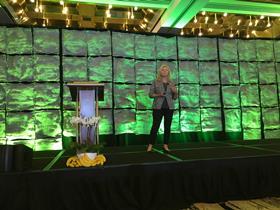
The EU’s stance on buprofezin use in insecticides could hamper the fresh produce trade and authorities should take a risk-based approach instead, a leading manufacturer has claimed.
Buprofezin is a insect growth regulator that is used on bananas, citrus, grapes and vegetables and has been used for the past 30 years without a problem, according to Dr Lydia Cox of Nichino America. However the EU has determined that the chemical has the potential to form traces of aniline, which is more commonly used in industrial processes such as plastics and dyes and has been found to cause tumours in male rats.
The EU is restricting domestic use of buprofezin within the bloc to non-edible crops to ward off the potential for aniline formation, but Cox pointed out that aniline is a naturally-occurring compound in various food commodities, with other pesticides also having the potential to form it.
“Recent scientific evaluations conclude that aniline is likely to act through a non-genotoxic mechanism for which there is a threshold effect,” she told an audience at the International Banana Congress in Miami. “Therefore, an acceptable exposure level protective of human health can be set.”
Cox called on the EU to base its decisions on determination of risk, not a presumption of hazard, adding that proposals to lower MRLs in the EU to the default level of 0.01mg/kg would have a negative impact on exports for buprofezin-treated commodities to the EU.
She added that all stakeholders, including government and commodity groups, should work together to ensure sensible decisions be reached. Otherwise, Cox said, growers will lose 'a valuable tool for control of pests which cause damage to crops and have a long history of safe use', pointing out that for crops like bananas the edible part contains no buprofezin residues and there is therefore no risk to consumers.



